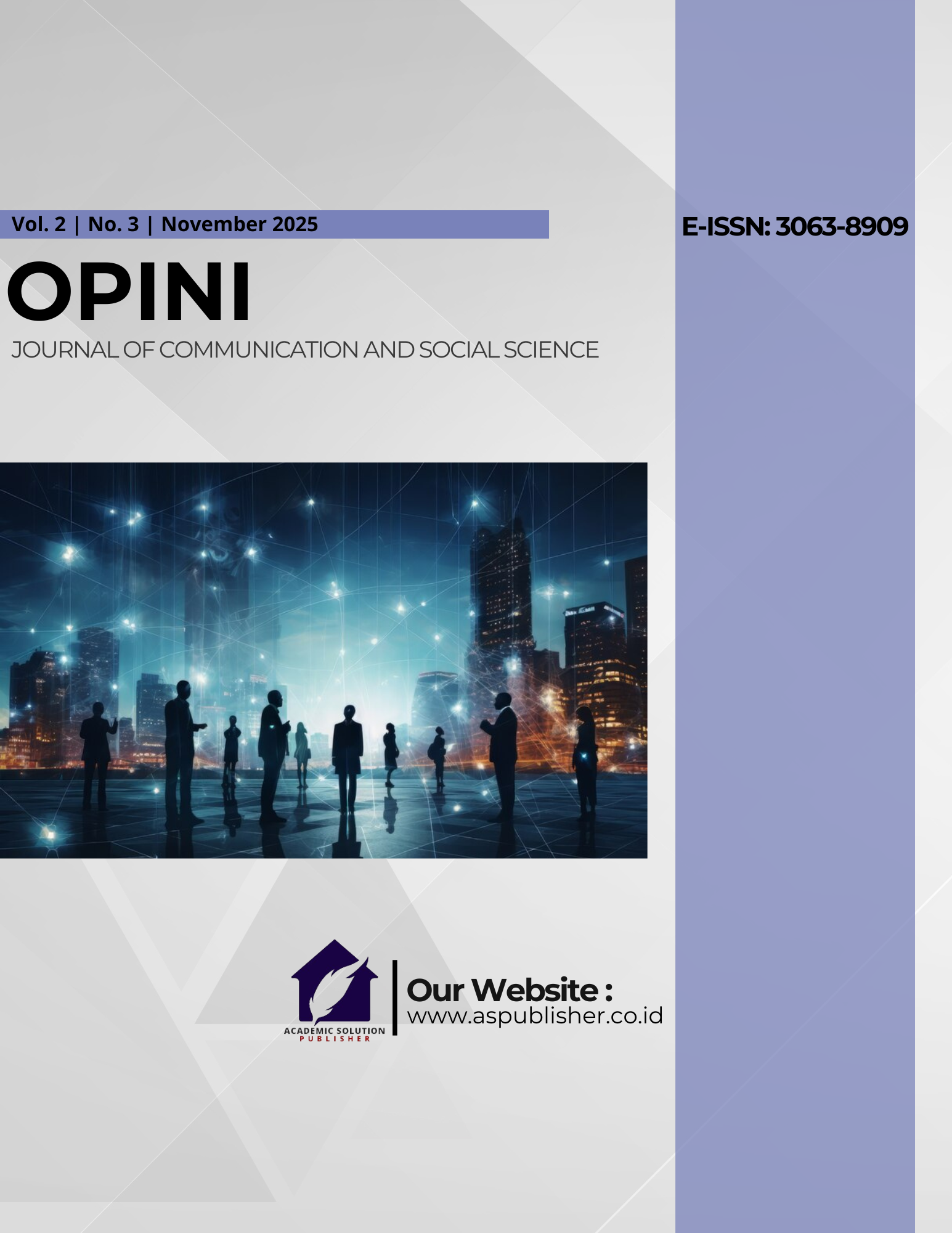NAVIGATING PRIVACY BOUNDARIES BY INTERNATIONAL ONLINE GAMING PLAYERS
DOI:
https://doi.org/10.70489/4d217r60Keywords:
online gaming, privacy boundaries, intimacy negotiation, self-disclosure, intercultural communicationAbstract
This article examines how international online gaming players navigate privacy boundaries in digital interaction, with particular attention to intimacy negotiation across cultural contexts. Using participant observation and autoethnography, the researcher immersed as a player in multiplayer games, joined guilds, and conducted interviews via in-game chat and external platforms. Findings reveal that privacy boundaries are managed through layered self-disclosure, reliance on game affordances such as guild and party systems, and the strategic migration of communication to platforms like Discord and WhatsApp. Cross-cultural differences are also evident: Indonesian players tended to be more cautious and gradual in disclosure, while Western players were more direct in revealing personal information. The study contributes to Communication Privacy Management (CPM) scholarship by highlighting the role of intercultural dynamics in digital intimacy and underscores the fragility of online relationships, which can be both rapidly formed and easily dissolved.
References
Andhika, R., & Syahputra, I. (2019). Interaksi dan identitas pemain Mobile Legends: Studi etnografi virtual. Koneksi, 3(1), 125–137. https://doi.org/10.24912/kn.v3i1.5689
Baruh, L., & Cemalcilar, Z. (2018). Privacy concerns in digital environments: A review of research and a framework for future studies. New Media & Society, 20(3), 108–125. https://doi.org/10.1177/1461444816654464
Braun, V., & Clarke, V. (2019). Reflecting on reflexive thematic analysis. Qualitative Research in Sport, Exercise and Health, 11(4), 589–597. https://doi.org/10.1080/2159676X.2019.1628806
Chen, V. H. H., & Duh, H. B. L. (2020). Online gaming and social interaction: Mediated communication in virtual worlds. Computers in Human Behavior, 113, 106456. https://doi.org/10.1016/j.chb.2020.106456
Cole, H., & Griffiths, M. D. (2018). Social interactions in massively multiplayer online role-playing gamers. Cyberpsychology & Behavior, 11(6), 575–583. https://doi.org/10.1089/cpb.2007.9988
Fox, J., & Tang, W. Y. (2017). Women’s experiences with general and sexual harassment in online video games: Rumination, organizational responsiveness, withdrawal, and coping strategies. New Media & Society, 19(8), 1290–1307. https://doi.org/10.1177/1461444816635778
Hofstede, G. (2018). Culture’s Consequences: Comparing Values, Behaviors, Institutions and Organizations Across Nations. Thousand Oaks, CA: Sage.
Hsu, C. L., Chang, K. C., & Huang, H. C. (2019). Understanding online game communities: A social capital perspective. Information & Management, 56(1), 1–10. https://doi.org/10.1016/j.im.2018.03.006
Kowert, R., Breuer, J., & Quandt, T. (2020). Women are from FarmVille, men are from ViceCity: The cycle of exclusion and sexism in video game content and culture. Journal of Communication, 70(3), 363–386. https://doi.org/10.1093/joc/jqaa007
Lestari, P., & Wulandari, S. (2022). Identitas digital dan negosiasi privasi di media sosial: Perspektif mahasiswa komunikasi. Jurnal ASPIKOM, 7(2), 215–229. https://doi.org/10.24329/aspikom.v7i2.1234
Lomanowska, A. M., & Guitton, M. J. (2018). Online intimacy and well-being in the digital age. Internet Interventions, 13, 24–29. https://doi.org/10.1016/j.invent.2018.05.002
Markham, A. (2018). Afterword: Ethics as methods: Doing ethics in the era of big data research. Social Media + Society, 4(3), 1–9. https://doi.org/10.1177/2056305118784502
Petronio, S. (2018). Communication Privacy Management Theory. Oxford: Oxford University Press.
Pink, S., Horst, H., Postill, J., Hjorth, L., Lewis, T., & Tacchi, J. (2019). Digital Ethnography: Principles and Practice. London: Sage.
Pratama, Y. (2020). Game online dan konstruksi identitas remaja: Perspektif komunikasi interpersonal. Jurnal Komunikasi, 12(1), 45–59. https://doi.org/10.25008/jk.v12i1.789
Suryani, N. (2020). Etnografi digital dalam penelitian komunikasi: Studi pada komunitas gamer Indonesia. Jurnal Komunikasi Indonesia, 9(1), 67–81. https://doi.org/10.7454/jki.v9i1.1123
Syahputra, I. (2021). Privasi, identitas, dan media digital: Perspektif generasi muda Indonesia. Jurnal Komunikasi Indonesia, 10(2), 155–170. https://doi.org/10.7454/jki.v10i2.1254
Wohn, D. Y. (2019). Video game communities as sites of social capital. Information, Communication & Society, 22(2), 1–17. https://doi.org/10.1080/1369118X.2017.1349827
Downloads
Published
Issue
Section
License
Copyright (c) 2025 Sofiari Ananda (Author); Nur Fitriyani Saputri (Translator)

This work is licensed under a Creative Commons Attribution-ShareAlike 4.0 International License.








